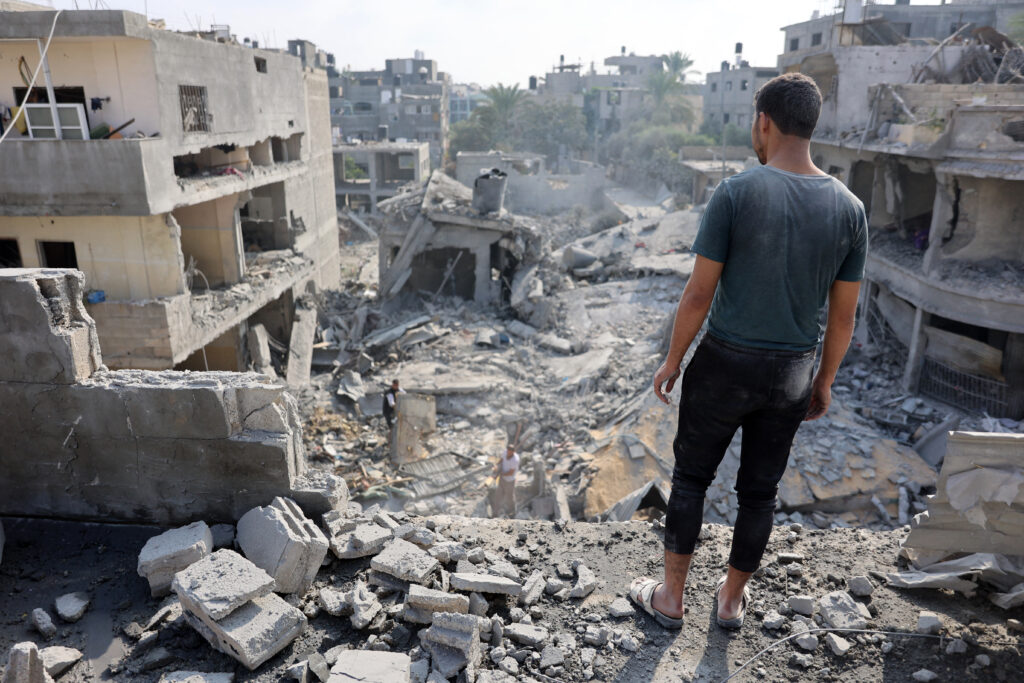Brussels – There is controversy surrounding the Remembrance Day celebrations at the European Parliament in Brussels. Dozens of relatives of Israeli hostages captured by Hamas have protested against the choice of some MEPs to invite Tel Aviv’s minister Amichai Chikli as the chief guest at a side event, citing his opposition to the ceasefire in Gaza and his speeches deemed in favour of deportation of certain ethnic groups as reasons for judging him “inappropriate” to represent the Jewish community.
The main event sponsored by the EU Parliament in remembrance of the Shoah will be held on Wednesday (Jan. 29) inside the hemicycle, where a musical performance will be held to commemorate the Hungarian-born cellist Pál Hermann, a victim of the Holocaust perpetrated by Nazi Germany and its European collaborators. Remembrance Day actually falls on January 27, and this year marks the 80th anniversary of the liberation of the Auschwitz-Birkenau concentration camp.
But on the evening of January 28, a side event is expected to be held whose keynote speaker, Israeli Minister for the Diaspora Amichai Chikli, was deemed an “inappropriate representative” by 41 relatives of the October 7, 2023 survivors and 32 leaders of Jewish communities in various countries, who addressed a letter to the MEPs responsible for the event.
The missive—addressed to the organizers Lukas Mando and Andrey Kovatchev as well as to House Speaker Roberta Metsola and Manfred Weber, the head-master of the European People’s Party (to which all the parliamentarians just mentioned belong)—states among the reasons for this request Chikli’s “support” for politicians of the European far right and his public statements in favour of expelling individuals from the Gaza Strip and southern Lebanon, which were judged equivalent to an incitement to ethnic cleansing.

“Minister Chikli’s extremist and divisive positions do not reflect the values or voices of the broader Israeli public or the global Jewish communities,” the document reads, where it points out on the contrary that “his participation in this event risks overshadowing the vital message of the conference and undermining the credibility of the European Parliament’s efforts to combat anti-Semitism and hatred.” “His presence does not serve the memory of the Holocaust or the shared principles of justice and tolerance that guide your and our efforts,” the letter adds.
The petitioners continue adding that Chikli’s appreciation for several controversial personalities of the European ultra-right—from Marine Le Pen in France to Călin Georgescu in Romania (whose victory in the first round of the presidential has been cancelled by the Constitutional Court, sparking a severe political crisis in the Balkan country)—”call into question his credibility” as head of Jewish diaspora affairs.
Last September, the minister suggested the creation of a “buffer zone” in southern Lebanon with the aim of “pushing back the enemy Shiite population,” arguing that the Cedar Country did not meet the minimum conditions to define itself as a state.
Minister of Diaspora Affairs: ‘Renewed buffer zone in Lebanon a must’ https://t.co/ITOlp2wYtp
via @JNS_org
– עמיחי שיקלי – Amichai Chikli (@AmichaiChikli) September 27, 2024
Moreover, the news came in the last few hours that Israeli troops will not withdraw from South Lebanon as agreed in the ceasefire stipulated last November, according to which they were supposed to abandon the area below the Litani River to leave it in the hands of the Beirut Armed Forces.
Chikli belongs to the Likud, the conservative party of PM Benjamin Netanyahu (on whose head currently hangs an arrest warrant issued by the International Criminal Court, incidentally candidly ignored by several European leaders), and is one of the two ministers from this political force within the executive that on 18 January voted against approving the historic Gaza ceasefire agreement, along with the radical ultra-Orthodox right.
Mandl has so far refused to cancel the event (titled “Indoctrinating hatred of Jews”) or to replace the speaker who ended up at the centre of the controversy. “I don’t deal with domestic politics in Israel,” he cut short, adding that he has always “welcomed every representative of Israel, whether from the legislative or executive branch, government or opposition, civil society or other sectors,” and would continue to do so.
English version by the Translation Service of Withub







